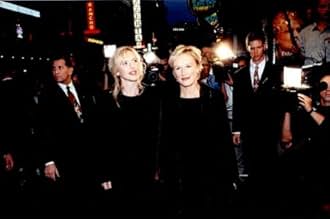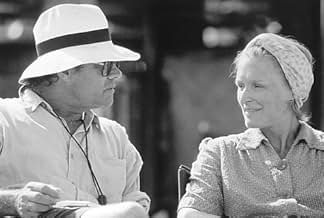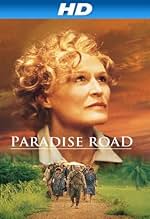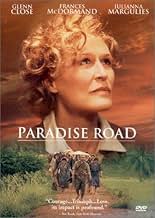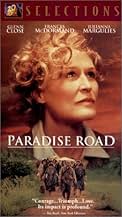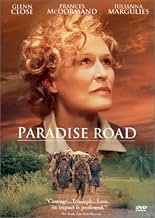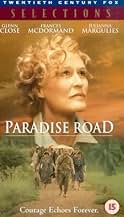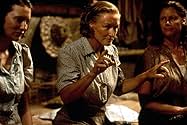NOTE IMDb
6,8/10
6,2 k
MA NOTE
Ajouter une intrigue dans votre langueA group of women who are imprisoned on the island of Sumatra by the Japanese during World War II use music to relieve their misery.A group of women who are imprisoned on the island of Sumatra by the Japanese during World War II use music to relieve their misery.A group of women who are imprisoned on the island of Sumatra by the Japanese during World War II use music to relieve their misery.
- Réalisation
- Scénario
- Casting principal
- Récompenses
- 1 victoire et 7 nominations au total
Johanna ter Steege
- Sister Wilhelminia
- (as Johanna Ter Steege)
Avis à la une
'Paradise Road' is not the first time the story of European and Australian prisoners of the Japanese during WW2 has been told - there is a famous old movie of Neville Shute's 'A Town Like Alice' and the BBC's wonderful tv series, 'Tenko', from the early 1980s. Nevertheless there is certainly scope for this film, which tells the story of a group of largely upper class women who have to come to terms with captivity and brutality as a 'defeated race' and somehow survive the war. The particular twist to this film is the fact-based story of the choir a group of women started in one camp. In other ways, however, the story is practically identical to 'Tenko', only crammed into around 2 hours instead of 30. This means that the effect is very much like watching one of those Reduced Shakespeare Company shows that do the Complete Works of Shakespeare in one performance. Virtually nothing happens in Paradise Road that doesn't happen in Tenko - fair enough, since it is fact based, but you feel like you're watching whole episodes crammed into a single line and you find yourself desperate for more character development - you never find out, for example, who Glenn Close's character really _is_. Despite this, the acting is top-hole and the script-writing is quite sparky, while production values are for the most part extremely high - this is a very good looking film. And therein lies a problem. While the violence is not sanitised, the starvation is. The women in this film appear to have suffered no more ill effects after 3 years of captivity and hard labour than a healthy sun tan and fetching urchin-style crop. The fight-in-the-shower scene shows us an array of perfect bodies with no sores, sunburn, bruises, skin diseases etc. (Again, Tenko did this much better.) When some of the women are meant to be dying of starvation towards the end the idea that these healthy women are meant to be suffering is so laughable as to be more like amateur dramatics than professional movie making. In failing to give a sense of the struggle to survive that the real women went through, this film diminishes their courage and does not do them justice.
This film is watchable, however, and tells stories that need to be told. Watch it by all means - but 'Tenko' is now out on video, so get that next!
This film is watchable, however, and tells stories that need to be told. Watch it by all means - but 'Tenko' is now out on video, so get that next!
Paradise Road is based on the true story of women POWs in Sumatra during WWII. The film, for the most part, follows what really happened... with one glaring exception!
The incident that is prominently missing from Paradise Road is the Bangka Island massacre, which was one of the worst atrocities committed against women POWs during WWII and is an integral part of this story.
After their ship, The SS Vyner Brooke, was sunk, the survivors made for the nearest land which was Bangka Island. They came to shore in different places but a group of more than a hundred people ended up on Radji beach. The group consisted of 22 Australian Army nurses, some civilian men, women and children, and 30 British soldiers from another ship which had been sunk. The island was fully occupied by the Japanese and the group unanimously decided to give themselves up. The group leader set off to find someone to surrender to. The civilian women and children began walking towards the main town on the island. The 22 nurses remained behind with the men and the soldiers (many of whom were badly wounded), an elderly British woman also remained with her wounded husband.
When the group leader returned with a group of 20 Japanese, they ignored all requests for surrender. The Japanese shot and bayoneted the men, then ordered the 23 women to walk into the ocean. When they reached waist depth, the Japanese open fired with a machine gun and mowed the women down.
There was one survivor. One of the nurses, Vivian Bullwinkel, was shot through the side and survived by pretending to be dead. She hid in the jungle for 12 days, caring for a British soldier who had been bayoneted and left for dead (he later died). Eventually, she gave herself up and was re-united with the rest of the women in the prison camp in Muntok. When she told them what had happened on the beach and they quickly realised that they would all be killed if the Japanese learned there was a witness to the massacre. So they made a pact not to speak of it again until they were free.
Paradise Road is a fictional film based loosely on fact, not a documentary. Sometimes it is necessary to make changes to the real sequence of events in order for the film's structure and pacing to work. I do accept this and I would prefer to see a good film rather than a accurate one.
But in leaving out the massacre on the beach, the film does a disservice to these women. These women were aware, from the start of their internment, that the Japanese were capable of atrocities on a massive scale and that there was no safety in numbers. They lived in a constant state of fear that the Japanese would repeat such an act or learn that Vivian Bullwinkel had survived the massacre and kill them all.
Paradise Road tries to portray Japanese atrocities with a fictitious incident where a woman is set on fire (which did not really happen) but this does not compare to the scale of the 80 people massacred on Radji beach and the effect it had on the women in the camp. There were 32 Australian Army nurses in the camp and the women who died on the beach were their friends and colleagues. They were from the same unit and had nursed together for the first two years of the war. All their interactions with the Japanese guards were coloured by the knowledge that they had murdered 22 of their friends in cold blood.
Paradise Road is a very good movie and I suspect it will become the definitive film about female POWs during WWII. Which sadly means that the 22 women who were murdered on Radji beach will be lost from memory... and they deserve better than that.
If you want to learn more about the women POWs of Sumatra, I suggest you read "White Coolies: Australian Nurses Behind Enemy Lines," the diary kept by camp survivor Betty Jeffrey, or read the biography "Bullwinkel" by Norman G. Manners. There is also an excellent 1985 documentary called "Song of Survival", and a really tacky episode of "Willesee's Australians" that dramatises the story of Vivian Bullwinkel.
The incident that is prominently missing from Paradise Road is the Bangka Island massacre, which was one of the worst atrocities committed against women POWs during WWII and is an integral part of this story.
After their ship, The SS Vyner Brooke, was sunk, the survivors made for the nearest land which was Bangka Island. They came to shore in different places but a group of more than a hundred people ended up on Radji beach. The group consisted of 22 Australian Army nurses, some civilian men, women and children, and 30 British soldiers from another ship which had been sunk. The island was fully occupied by the Japanese and the group unanimously decided to give themselves up. The group leader set off to find someone to surrender to. The civilian women and children began walking towards the main town on the island. The 22 nurses remained behind with the men and the soldiers (many of whom were badly wounded), an elderly British woman also remained with her wounded husband.
When the group leader returned with a group of 20 Japanese, they ignored all requests for surrender. The Japanese shot and bayoneted the men, then ordered the 23 women to walk into the ocean. When they reached waist depth, the Japanese open fired with a machine gun and mowed the women down.
There was one survivor. One of the nurses, Vivian Bullwinkel, was shot through the side and survived by pretending to be dead. She hid in the jungle for 12 days, caring for a British soldier who had been bayoneted and left for dead (he later died). Eventually, she gave herself up and was re-united with the rest of the women in the prison camp in Muntok. When she told them what had happened on the beach and they quickly realised that they would all be killed if the Japanese learned there was a witness to the massacre. So they made a pact not to speak of it again until they were free.
Paradise Road is a fictional film based loosely on fact, not a documentary. Sometimes it is necessary to make changes to the real sequence of events in order for the film's structure and pacing to work. I do accept this and I would prefer to see a good film rather than a accurate one.
But in leaving out the massacre on the beach, the film does a disservice to these women. These women were aware, from the start of their internment, that the Japanese were capable of atrocities on a massive scale and that there was no safety in numbers. They lived in a constant state of fear that the Japanese would repeat such an act or learn that Vivian Bullwinkel had survived the massacre and kill them all.
Paradise Road tries to portray Japanese atrocities with a fictitious incident where a woman is set on fire (which did not really happen) but this does not compare to the scale of the 80 people massacred on Radji beach and the effect it had on the women in the camp. There were 32 Australian Army nurses in the camp and the women who died on the beach were their friends and colleagues. They were from the same unit and had nursed together for the first two years of the war. All their interactions with the Japanese guards were coloured by the knowledge that they had murdered 22 of their friends in cold blood.
Paradise Road is a very good movie and I suspect it will become the definitive film about female POWs during WWII. Which sadly means that the 22 women who were murdered on Radji beach will be lost from memory... and they deserve better than that.
If you want to learn more about the women POWs of Sumatra, I suggest you read "White Coolies: Australian Nurses Behind Enemy Lines," the diary kept by camp survivor Betty Jeffrey, or read the biography "Bullwinkel" by Norman G. Manners. There is also an excellent 1985 documentary called "Song of Survival", and a really tacky episode of "Willesee's Australians" that dramatises the story of Vivian Bullwinkel.
The film was both moving and heart warming. It shows the unbelievable story of a group of women surviving a PoW camp against all the odds. I found it hard to believe that anyone was made to live in the conditions they were put in and live to tell the story. The acting was excellent and i don't think this film has got the praise it deserves. It is made even more moving by the fact it is based on a true story.
This film gripped me from the opening scene in the hotel ballroom and prooved to be a class act right to the end. Director Bruce Beresford's track record includes Driving Miss Daisy, Tender Mercies and Breaker Morant, so Paradise Road came as a special treat, not realising at the time of viewing that he had directed these films. The realistic scenes of violence had a tremendous impact in contrast to some of the wonderful underplaying of the leading actresses, notably Glenn Close and Pauline Collins. The Japanese actors, although unknown to me were chillingly effective. I can only hope for more films of this calibre but alas they are few and far between.
Why didn't more people see this film? This is what makes it great:
As an ensemble piece it works wonderfully - the cast are truly magnificent. Glenn Close is fabulous as the 'central' character and most well known 'star', but she does not monopolise all the scenes and screen time. She blends in with what is a wonderful cast, and does so impeccably. Why she hasn't been given more kudos as an actress is beyond me - she is stunning.
The film worked perfectly because of what comes across as a genuine rapport between the female cast. Each actress brings a different element to the story - Jennifer Ehle is strong willed and beautiful, Julianna Marguilles fiesty and dominant, Pauline Collins has such a human quality which she conveys to perfection, Cate Blanchett portrays wonderfully a quiet woman with a rebellious side. All compliment and balance each other. The actresses succeed admirably in bringing to the fore the bond that grew between their real life inspirations for this story.
The direction is precise and the cinematogrpahy beautiful. Despite the bleak context, Japan still looks vibrant and colourful, full of life.
The score. I can't do justice to the score in words - the vocal orchestra formed by the women is just beautiful and poignant to listen to and really does need to be heard to be understood. Somehow the actresses manage to make the music symbolise their humanity and spirit. It works wonderfully.
Overall, this is a heartfelt film with a profound message of hope which runs all the way through it. 'Paradise Road' is one of those rare films which reminds you of the indestructible nature of the human spirit. I wish there were more films like this one, and I wish more people had have seen this film. In a word it's a gem.
As an ensemble piece it works wonderfully - the cast are truly magnificent. Glenn Close is fabulous as the 'central' character and most well known 'star', but she does not monopolise all the scenes and screen time. She blends in with what is a wonderful cast, and does so impeccably. Why she hasn't been given more kudos as an actress is beyond me - she is stunning.
The film worked perfectly because of what comes across as a genuine rapport between the female cast. Each actress brings a different element to the story - Jennifer Ehle is strong willed and beautiful, Julianna Marguilles fiesty and dominant, Pauline Collins has such a human quality which she conveys to perfection, Cate Blanchett portrays wonderfully a quiet woman with a rebellious side. All compliment and balance each other. The actresses succeed admirably in bringing to the fore the bond that grew between their real life inspirations for this story.
The direction is precise and the cinematogrpahy beautiful. Despite the bleak context, Japan still looks vibrant and colourful, full of life.
The score. I can't do justice to the score in words - the vocal orchestra formed by the women is just beautiful and poignant to listen to and really does need to be heard to be understood. Somehow the actresses manage to make the music symbolise their humanity and spirit. It works wonderfully.
Overall, this is a heartfelt film with a profound message of hope which runs all the way through it. 'Paradise Road' is one of those rare films which reminds you of the indestructible nature of the human spirit. I wish there were more films like this one, and I wish more people had have seen this film. In a word it's a gem.
Le saviez-vous
- AnecdotesThe music in the film was derived from the actual score transcripts used in the P.O.W camps which survived World War II.
- GaffesThe women of the choir did the singing while sitting down because of having to work in the extreme heat during the day left them exhausted.
- Citations
Adrienne Pargiter: You don't hate them do you?
Margaret Drummond: No.
Adrienne Pargiter: Why not?
Margaret Drummond: I've tried, but I can't bring myself to hate people. The worse they behave, the sorrier I feel for them.
- Bandes originalesSymphony No. 9 in E minor Op. 95 'From the New World' II. Largo
Written by Antonín Dvorák (as Antonin Dvorak)
Meilleurs choix
Connectez-vous pour évaluer et suivre la liste de favoris afin de recevoir des recommandations personnalisées
- How long is Paradise Road?Alimenté par Alexa
Détails
- Date de sortie
- Pays d’origine
- Langues
- Aussi connu sous le nom de
- Дорога в рай
- Lieux de tournage
- Sociétés de production
- Voir plus de crédits d'entreprise sur IMDbPro
Box-office
- Budget
- 16 000 000 $US (estimé)
- Montant brut aux États-Unis et au Canada
- 2 007 100 $US
- Week-end de sortie aux États-Unis et au Canada
- 62 518 $US
- 13 avr. 1997
- Montant brut mondial
- 2 007 100 $US
- Durée2 heures 2 minutes
- Couleur
- Mixage
- Rapport de forme
- 2.35 : 1
Contribuer à cette page
Suggérer une modification ou ajouter du contenu manquant


